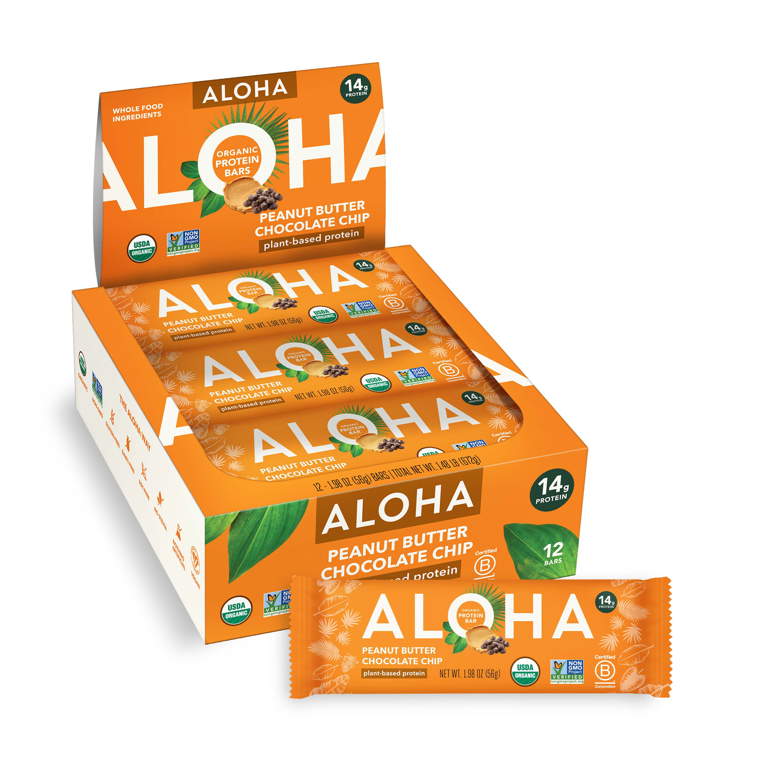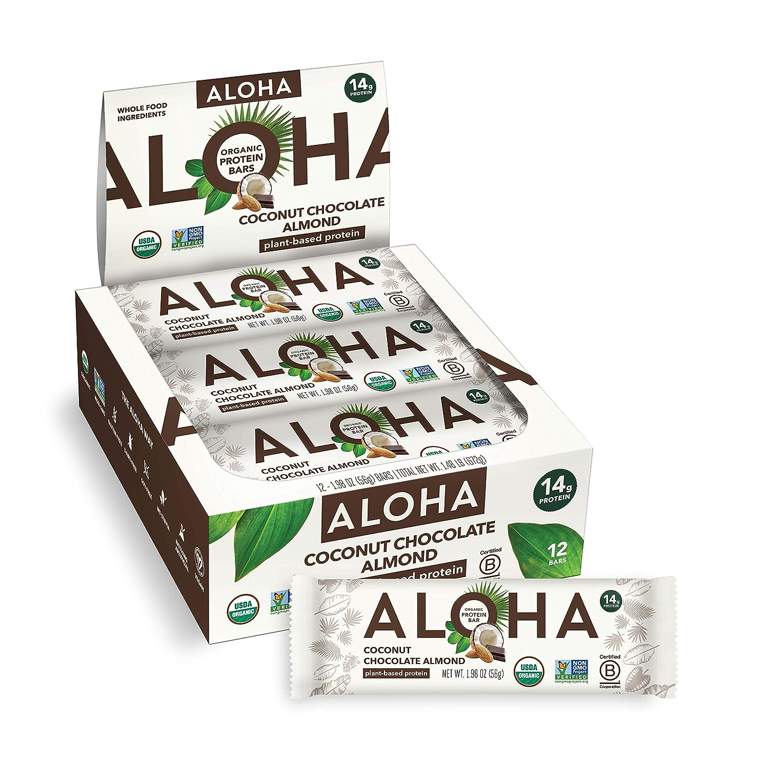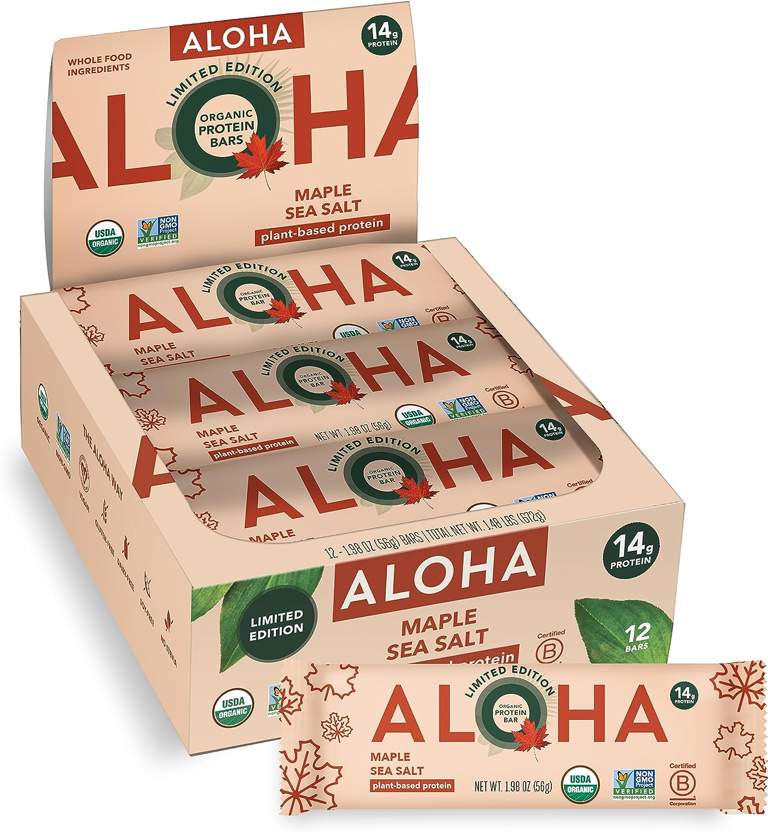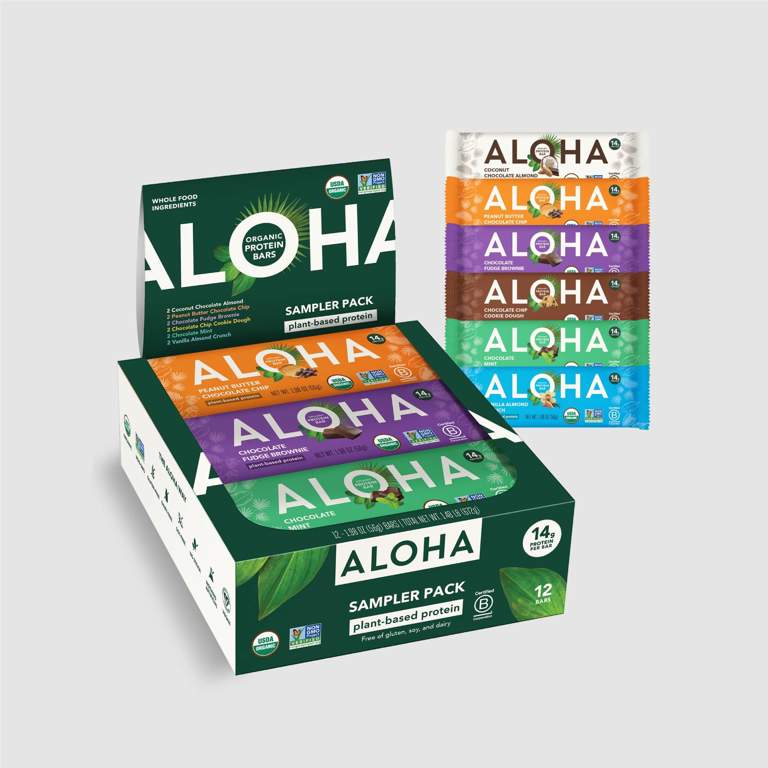ALOHA Best-Selling Protein Bars
- ALOHA Organic Plant Based Protein Bars | Chocolate Caramel Pecan | 12 Count, 1.98oz Bars | Vegan, Low Sugar, Gluten Free, Paleo, Low Carb, Non-GMO, Stevia Free, Soy Free, No Sugar Alcohol Sweeteners Shop
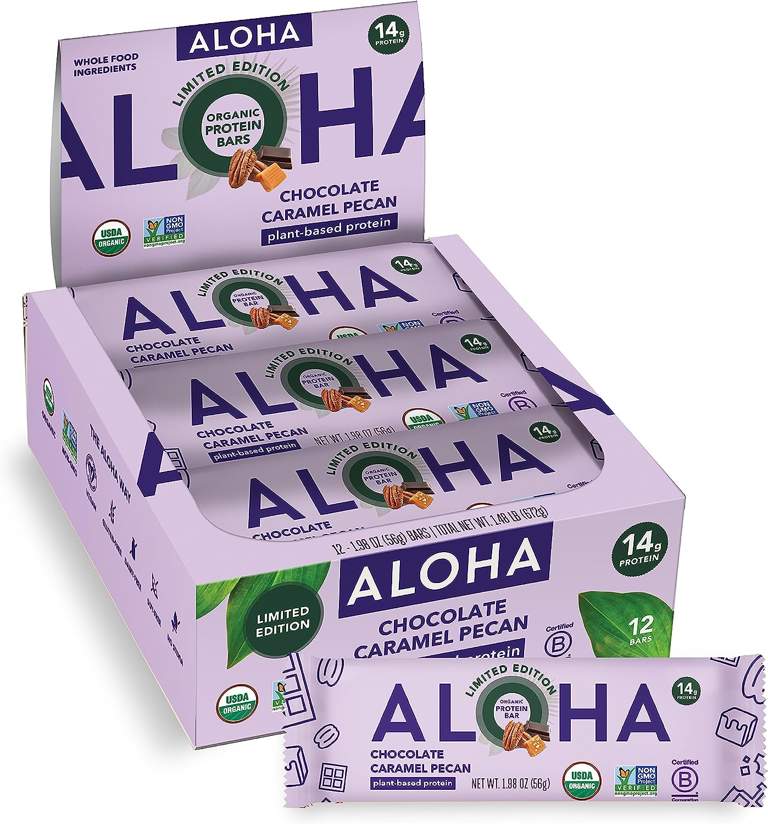
- ALOHA Organic Plant Based Protein Bars - Peppermint White Chocolate , Vegan, Low Sugar, Gluten-Free, Paleo, Low Carb, Non-GMO, No Stevia, No Erythritol - LIMITED EDITION, 12 Count (Pack of 1) Shop
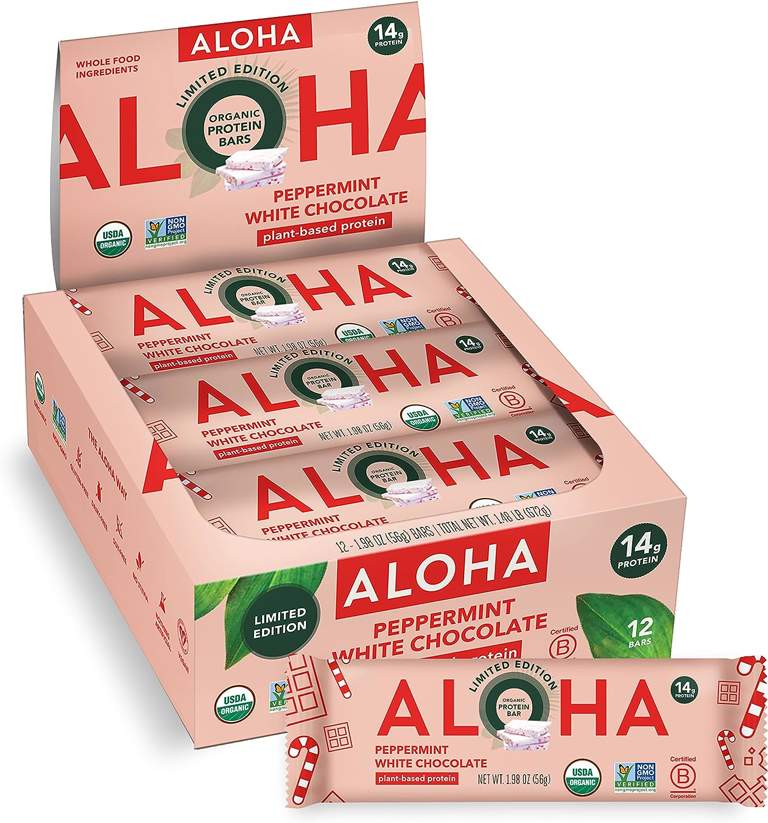
- ALOHA Organic Plant Based Protein Bars | Raspberry White Chocolate | 12 Count, 1.98oz Bars | Vegan, Low Sugar, Gluten Free, Paleo, Low Carb, Non-GMO, Stevia Free, Soy Free, No Sugar Alcohol Sweeteners: LIMITED EDITION Shop
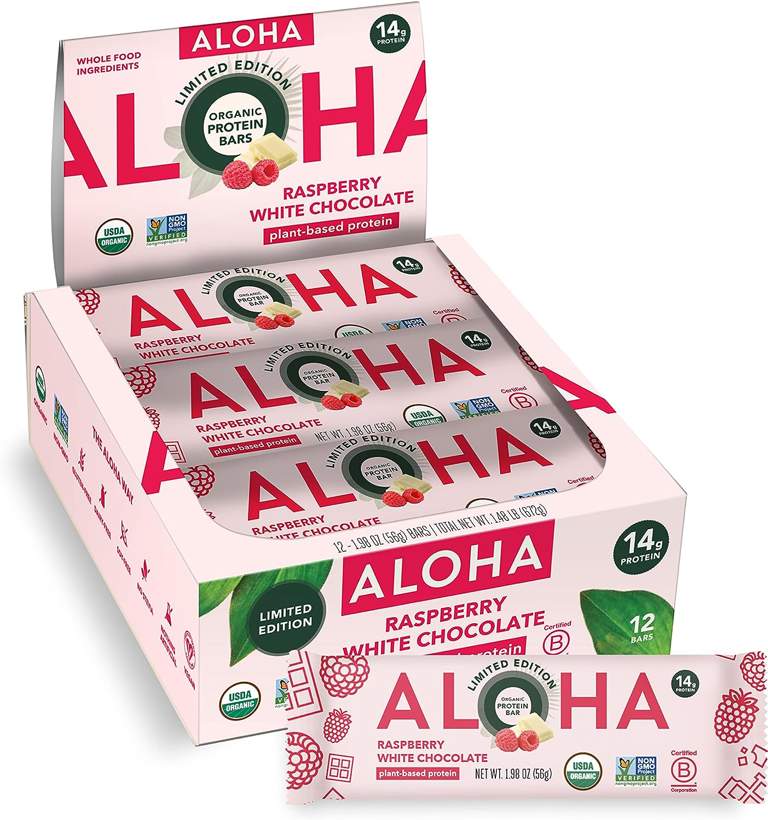
- ALOHA Organic Plant Based Protein Bars | The Kona Bar - Special Edition | 6 Count, 1.98oz Bars | Vegan, Low Sugar, Gluten Free, Paleo, Low Carb, Non-GMO, Stevia Free, Soy Free, No Erythritol Shop
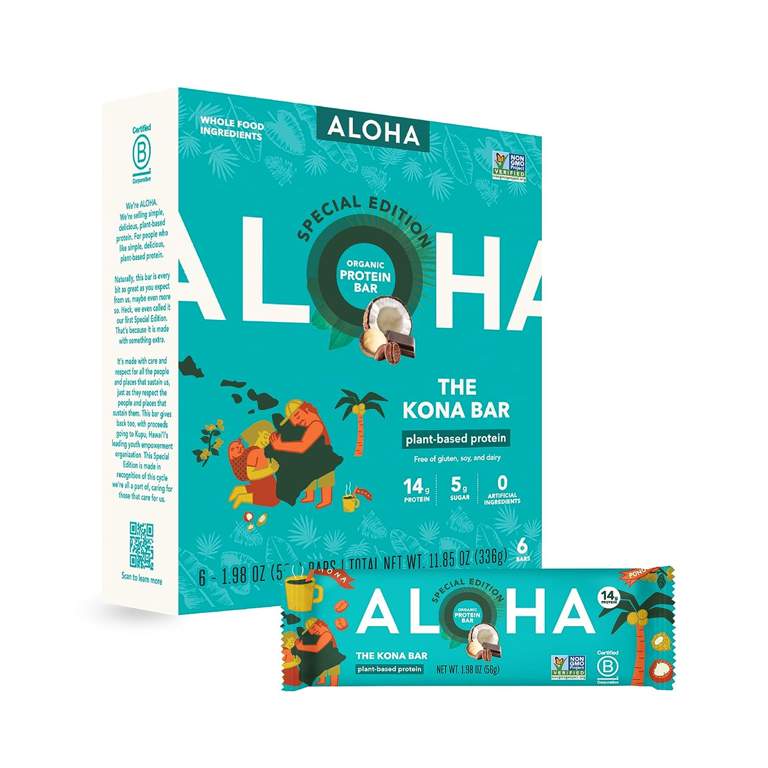
Explore ALOHA Questions for Protein Bars
-
Organic Protein Bars: What's Best?
-
ALOHA vs. Clif Bar: Head-to-Head Comparison
-
Barbell Workouts and Protein Bars: Am I Eating Enough?
-
Vegan Protein Bars and Muscle Gain: Myths and Truths
-
Gluten-Free Protein Bars: Here's the Lowdown
-
Low-Carb Protein Bars: Do They Help with Weight Loss?
-
ALOHA vs. Go Macro: Protein Bar Comparison
-
Are Protein Bars Healthy? Ideas for New Year's Resolutions
About Protein Bars
Protein bars are convenient, on-the-go snacks designed to provide a substantial amount of protein in a compact and portable form. These bars often contain a blend of different proteins, carbohydrates, fats, vitamins, and minerals, catering to individuals who seek to supplement their diet with additional protein, maintain muscle mass, and sustain energy levels throughout the day.
Types of Protein Bars
Protein bars can be broadly categorized based on their primary protein sources:
Whey Protein Bars: Derived from milk, these bars are rich in essential amino acids and are efficiently absorbed by the body.
Casein Protein Bars: Also sourced from milk, they digest slowly, providing a steady release of amino acids over time.
Soy Protein Bars: A plant-based option that is often chosen by vegetarians and vegans. It contains all nine essential amino acids.
Pea and Rice Protein Bars: These hypoallergenic bars are suitable for those with dietary restrictions.
Mixed Plant-Based Protein Bars: These bars combine different plant proteins, such as pea, brown rice, hemp, and pumpkin seed proteins, to provide a complete amino acid profile. Aloha's plant-based protein bars fall into this category, ensuring a product free from common allergens like gluten, dairy, and soy while still delivering 14g of protein per serving.
How to Choose Protein Bars
Selecting the right protein bar depends on your dietary preferences, nutritional needs, and taste. Here are some tips to consider:
Protein Content: Check for a substantial amount of protein that aligns with your dietary goals.
Ingredient Quality: Look for bars with whole food ingredients and without artificial additives.
Dietary Requirements: Ensure the bar meets your dietary restrictions, such as vegan, gluten-free, or keto-friendly.
Sugar Content: Opt for bars with low sugar levels to avoid energy spikes and crashes.
Taste and Texture: Choose a flavor that appeals to you and a texture that you enjoy, whether it be chewy, crunchy, or soft.
ALOHA's Plant-Based Protein Bars
When choosing a nutritious snack, the assurance of purity and quality in every bite is paramount. Aloha.com's plant-based protein bars are meticulously crafted to align with what health-conscious consumers seek. Why consider Aloha.com's offerings?
Plant-Based Nutrition: Our protein bars deliver 14 grams of quality protein from sources like organic pea and brown rice proteins, without relying on any animal products.
Low in Sugar: Managing sugar intake is essential for a balanced diet; therefore, these bars contain minimal sugar.
Organic and Non-GMO: Each ingredient is thoughtfully chosen to be USDA Organic and Non-GMO Project Verified, committing to a high standard of safety and environmental care.
Diet-friendly: Designed to accommodate various preferences and needs, the bars are vegan, gluten-free, Non-GMO Project Certified, and kosher, excluding common allergens like gluten, dairy, soy, and sugar alcohols.
Diverse Flavors: With 21 different flavors, including favorites like The Kona Bar and Peanut Butter Cup Protein Bar, there are options to satisfy every palate.
Each Aloha.com protein bar is not just a snack; it's a carefully formulated source of energy and nutrition for busy, health-aware individuals. These bars are an excellent choice for those who will not settle for anything less than delicious, wholesome, and responsible eating.
Protein Bar FAQs
What is the purpose of consuming protein bars?
Protein bars are designed to serve as a convenient source of protein and other nutrients. They are often used by people who need a quick and portable energy boost, require supplemental protein intake for muscle building and repair or desire a healthier snack alternative to traditional fast-food options. Aloha's plant-based protein bars, for example, offer substantial protein content in an organic, grab-and-go form.
How do protein bars fit into a balanced diet?
Protein bars can complement a balanced diet by providing an easy source of protein, which is essential for muscle repair, immune function, and other vital bodily processes. They are best used as a snack between meals or as a post-workout replenishment. However, they should not completely replace whole foods that offer a broader range of nutrients.
Can protein bars help with weight loss?
Protein bars can be a practical addition to a weight loss diet because they can provide a satisfying snack with controlled portions and calorie content. The protein in the bars can help to keep you feeling full, which may reduce the likelihood of overeating. It's important to select bars that are low in sugar and calories and to use them as part of an overall healthy and active lifestyle.
Are protein bars suitable for vegetarians or vegans?
There are specific protein bars available that are suitable for vegetarians and vegans. These bars typically utilize plant-based protein sources like soy, pea, rice, or hemp. It's essential to check the label to ensure that the bar does not contain any animal products or by-products if adhering to a strict vegetarian or vegan diet.
How much protein should a protein bar provide?
The amount of protein in a bar should align with your individual protein needs, which can vary based on factors like age, gender, physical activity levels, and overall health goals. Generally, a good protein bar should offer between 10 to 20 grams of protein per serving, which can support muscle recovery and satiety.
What should I look for on the nutrition label of a protein bar?
When examining the nutrition label of a protein bar, you should pay attention to:
Protein content: Ensure it aligns with your dietary goals.
Sugar content: Opt for lower sugar amounts to prevent blood sugar spikes.
Calories: Factor this into your daily caloric intake, especially if you are managing your weight.
Fat content: Check that fats come from healthy sources and are present in reasonable amounts.
Dietary fiber: Look for bars with a higher fiber content for digestive health and satiety.
Can protein bars be consumed before or after workouts?
Yes, protein bars can be consumed either before or after workouts. Consuming a protein bar before a workout can give you an energy boost and supply protein to your muscles as you exercise. Eating a protein bar after exercising can help repair and rebuild muscle tissues and replenish energy stores.
Are there any allergens commonly found in protein bars?
Common allergens that might be found in some protein bars include nuts, soy, dairy, wheat, and eggs. Always check the ingredients list if you have food allergies. There are many bars, such as Aloha's, which cater to those with specific dietary restrictions by avoiding common allergens.
How are protein bars different from energy bars or meal replacement bars?
Protein bars: Primarily focused on providing a high level of protein, often used for muscle building and recovery.
Energy bars: Typically contain a higher amount of carbohydrates for quick energy, suited for endurance activities.
Meal replacement bars: Usually provide a balance of carbohydrates, protein, and fats, along with vitamins and minerals, to serve as a substitute for a meal.
Choose the bar that best fits your nutritional needs and lifestyle.

